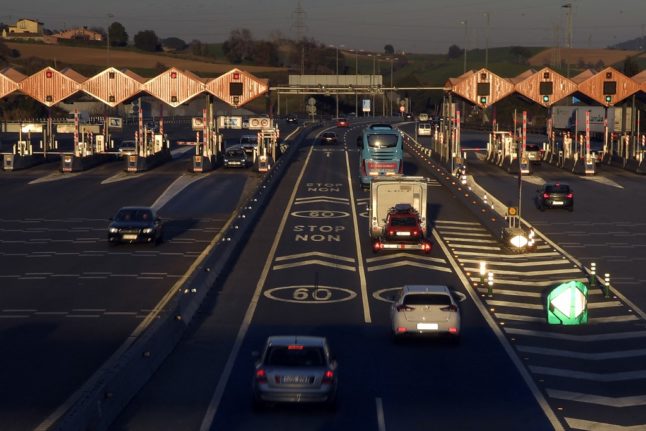In early 2021, the Spanish government appeared to concede to pressure from the EU to introduce more tolls on its motorways.
One of the EU’s demands for allocating €140 billion to Spain as part of its Covid recovery plan was that in return Sánchez’s government started charging more on the country’s largely toll-free highways.
The plans appeared to have faded into the background, but now they’re back on the table as Spain’s Transport Ministry has started to study how it will implement tolls on high-capacity motorways by 2024.
Spain’s General Directorate of Highways, which depends on the Transport Ministry, has commissioned consultancy company Ineco to prepare nine reports to assess a new highway financing system.
READ ALSO: Tolls, stickers or free? Spain mulls future of its motorways
It was a report in Spanish news website El Confidencial which exposed the plans, which hadn’t actually been publicised by the Spanish government, and as could be expected in the current climate of spiralling inflation and sky-high fuel, electricity and other daily costs, the prospect of also having to pay for tolls has been hit by a huge backlash.
So much so that the country’s coalition left-wing government has rushed to minimise the claims, in the same vein as when it refused to label the motorway charges as tolls in 2021.
“No plans have been resumed,” said Transport, Mobility and Urban Agenda Minister Raquel Sánchez on national broadcaster RTVE.
“Given the complicated current context, it doesn’t seem like the most suitable time [to introduce tolls].
“The Spanish government will study all the different alternative,” Sánchez added, with the aim of seeking both “the consensus of the political parties and transport industry groups”.
In any case, Spanish consumer watchdog Facua has criticised the government’s toll plans, arguing that it will mainly affect those with lower purchasing power, suggesting that the funds should be taken from the country’s State Budget, financed by Spaniards’ taxes.
For their part, transport workers have already voiced their discontent at the prospect of the new motorway tolls.
“It would be a brutal increase in costs to add to the current fuel price rise we’re enduring” said Dulsé Diaz, Deputy Secretary General at the Spanish Confederation of Freight Transport (CETM).
Transport workers in Galicia have already announced they will go on strike if the tolls are implemented.
Although the details are yet to be confirmed, the new tolls will cost an average of between 3 and 5 euro cents per kilometre according to reports in the Spanish press.
As things stand, Spain is one of the countries in Europe where drivers currently pay the least for the use of its high-capacity road network, spending 76 percent less on tolls than the average for EU countries.
This lack of funding for maintenance has caused a deficit of €8 billion for the Spanish government which it is now looking to address, especially due to pressure from Brussels.
According to Spanish construction employers’ association APCE, the introduction of tolls on the country’s toll-free network (14,100 kilometres) would generate €12.6 billion a year that could be fed back into public coffers.
There are also reports suggesting that one of the aims will be to reduce territorial imbalances, since there are some Spanish regions where tolls are more common than in others.
But with millions of Spaniards struggling to make ends meet under the highest inflation rate in 37 years, it seems unlikely the Socialist-led government will want to fast-track such an unpopular measure, especially before the November 2023 general elections.



 Please whitelist us to continue reading.
Please whitelist us to continue reading.
Member comments